We have been coming across reports, more in the foreign media than in the Indian, of the military gains of the Tripoli-based Government of National Accord (GNA) headed by Prime Minister Fayez al-Sarraj at the expense of the Tobruk-based General Khalifa Haftar. Is it likely that sooner or later Haftar will be defeated and Libya will have a government based in Tripoli whose writ will run all over this vast country of over 6.8 million, with an area of 1.7 million square kilometers, rich in oil, political chaos, and instability?
A look at the mapbelow showsLibya borders from the west, Egypt, Sudan, Chad, Niger, Algeria, and Tunisia.
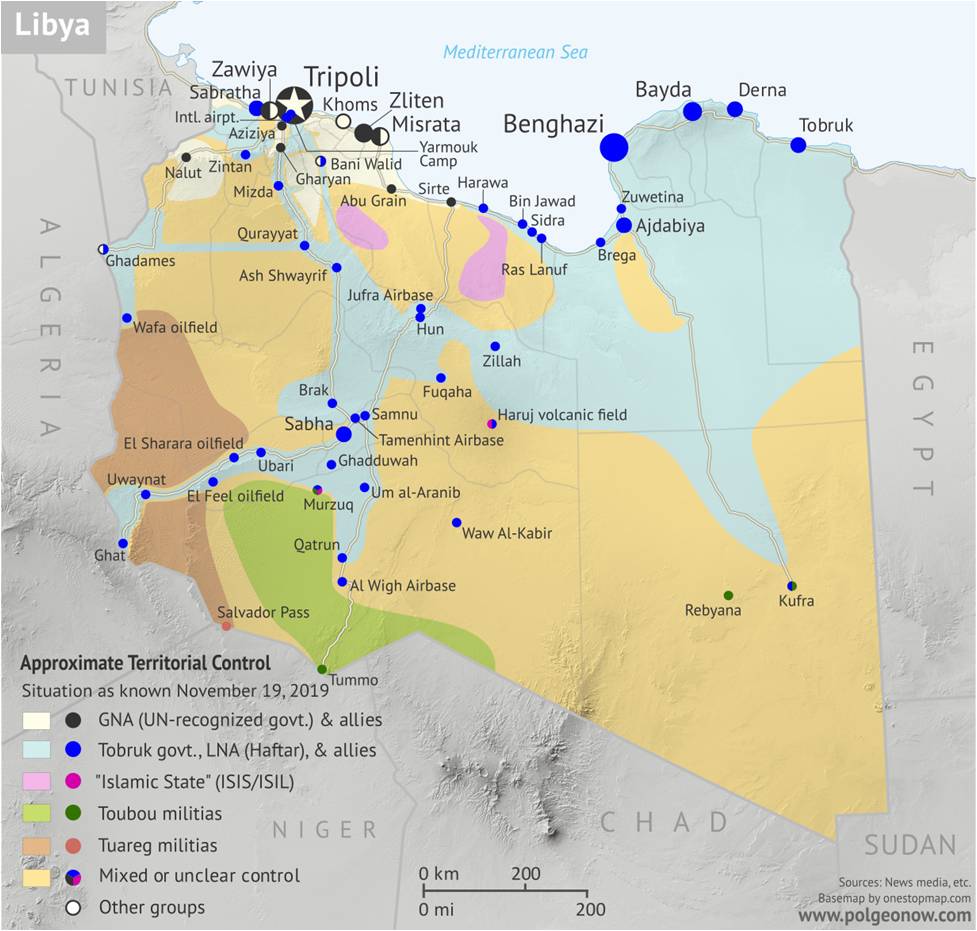
It is also obvious from the map that the two sides now engaged in a civil war do not control the whole of Libya between them. There are a few militias, including the Islamic State, that control territories.The fragmented nature of the Libyan polity makes it obvious that the winner of the current war, should there be a winner, will notnecessarily have control over the whole of the country.
We need to go back in history to put in perspective the current military confrontation between Tripoli and Tobruk. The Arab Spring that dawned in Tunisia felled its autocratic president Ben Ali, in office since 1987, in January 2011. The next autocrat to fall was Hosni Mubarak of Egypt, in office since 1981. Libya’s Mahmud Gaddafi, in power since 1969, was the third to fall.
However, there is an important difference. There was no external military intervention in Tunisia and Egypt. In the case of Libya, France’s President Sarkozy took the lead and the NATO undertook bombing claiming authorization from a convolutedly worded Security Council Revolution (1973 of17th March 2011) that Russia later regretted not vetoing. Gaddafi fled, was located, and shot dead on the spot, perhaps by a French secret service officer. This happened on 20th October 2011.Incidentally, Gaddafi had financed Sarkozy’s 2007 election as President and the case against the latter for receiving foreign funds is still hanging fire.
The NATO was neither capable nor interested in rebuilding what it had destroyed. The monumental failure of the U.S. in Iraq to restore what it had destroyed in the 2003 invasion might have dissuaded NATO, even if it had the capacity. The U.N. stepped in and an election was held in July 2012 and a government was set up in Tripoli. The elected parliament extended its life illegally and when the postponed election was held in June 2014, the outgoing parliament refused to go, and the newly elected representatives moved to Tobruk under protection from General Haftar and established a rival government there.
There was more chaos in Tripoli and the U.N. brokered an agreement and Sarraj took over as Prime Minister in December 2015. His government is often referred to as the ‘U.N. – recognized government’, a misnomer as while the Secretary General deals with that government which has a permanent mission in New York, some member-states have been supporting Haftar who wants to topple it.
We need to look briefly at Haftar’s background. A military officer who supported Gaddafi in his 1969 coup, Haftar rose up rapidly in his career. He commanded the Libyan army that invaded Chad. The invasion proved to be a disaster and Haftar publicly surrendered. Gaddafi who wanted to maintain his lie that he had not sent troops to Chad ‘disowned’ Haftar. This was in 1987. The C.I.A. got Haftar out of Chad. He carried out unsuccessful military operations against Gaddafi with the support of the C.I.A. which brought him to U.S. in 1996. Haftar went back to Libya after Gaddafi fell and he was appointed the military commander by the Tripoli government in November 2011. The Prime Ministers had brief innings, Haftar developed political ambitions and eventually he became the commander of his self-styled Libyan National Army protecting the government in Tobruk. He is generally considered a ‘C.I.A. asset’.
Who are the external powers preventing the Libyans from working out a political compromise with the assistance of UN Secretary General’s Special Representative? Haftar has enjoyed support, military or diplomatic, or often both, from U.A.E, Egypt, Jordan, France, and Russia. Haftar set out his latest military campaign to bring down the government in Tripoli on 4th April 2019. A few days later he got a phone call from Trump, signaling support. Haftar made gains rapidly till Turkey intervened in January 2020 in support of the Tripoli-based government.
Why did Turkey get involved? It has been argued that President Erdogan wants to revive ‘the glory of the Ottomanpast’ when Turkey held an empire in Europe, Asia, and Africa. There might be some merit in the argument as Erdogan would thereby reap domestic political advantage as his domestic political base is shrinking, mainly because of the seriously troubled economy. However, there is a more compelling reason to do with oil/gas exploration in the Eastern Mediterranean.
The Eastern Mediterranean is a sea of claims and counter claims where the UN Convention on the Law of the Sea (UNCLOS) does not apply because not all the states have signed and ratified it. Two recent developments are of interest to us in the context of Libya.
First, on 20th March 2019, Greece, Israel, and Cyprus signed an intergovernmental agreement in the presence of U.S. Secretary of State Pompeio establishing an East-Med pipeline to export gas to Europe costing Euro 6 billion.
The second development stems from the opposition of Turkey and Libya to the East-Med project. Turkey approached the Tripoli-based government that was losing territory to Haftar. In November 2019 the two signed a memorandum of understanding that totally ignored the existence of Crete, the largest Greek island.
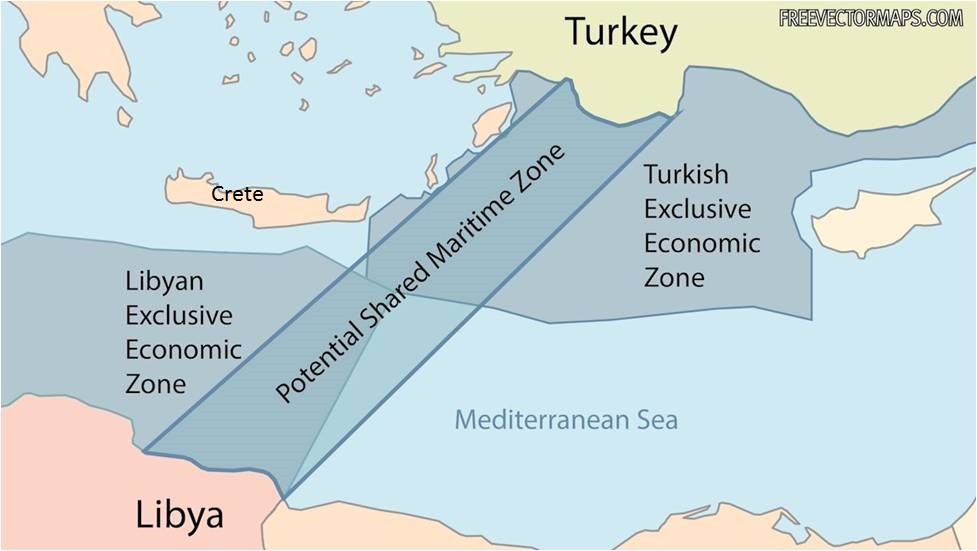
Athens expelled the ambassador of the Tripoli-based government and moved to establish diplomatic relations with the Tobruk-based government.
From the map it is clear that the pipeline planned by Israel, Greece, and Cyprus will have to pass through the shared zone between Libya and Turkey. In short, another conflict might soon break out in the Eastern Mediterranean as Turkey wants to give license for exploring and drilling in that zone.
In return for signing the MOU, Erdogan promised Sarraj military support. With Turkey’s entry into the war, the tide turned and Haftar started losing ground. Turkey with the second biggest standing army in the NATO, of course, can render effective military support to Sarraj.
However, we need to take note of another important player, Russia. We may recall that Russia had regretted not vetoing the UN SC Resolution 1973. In 2013, Russia withdrew its embassy from Tripoli after it was attacked. By 2015, Russia came back to Libya when the Tobruk-based government asked for military support. Since there is a U.N. embargo on supplying arms, Russia made use of a private agency, the Wagner Group. It supplied mercenaries and arms. Haftar was able to make gains in 2019 primarily because of the support from Russia.
It is wrong to believe that what is happening in Libya is a civil war where Libyans are fighting on either side. Haftar’s so-called Libyan National Army is neither Libyan nor national or even an army. Haftar is heavily dependent on paid mercenaries from Russia, Sudan, and elsewhere. The UAE is the main supplier of funds to pay the mercenaries. Even the Tripoli government has engaged mercenaries, especially thousands of Syrians sent by Turkey. In fact, Syrians are on both sides.
The U.S. has not been militarily engaged. The U.S. African Command (AFRICOM) headquartered in Germany is watching. AFRICOM’s General Stephen Townsend has recently told the media that 14 jet fighters have been sent to Libya in support of Haftar by Russia. As truth is the first casualty in any war, Russia has denied sending any fighter plane to Libya. However, it is obvious that the Pentagon is worried. Its worry is that just as Russia intervened decisively in Syria to prevent the imminent fall of President Assad, will it now find a military presence in eastern Libya. “Not only could Russian air power change the military balance in Libya itself, but this could be the first step in a gradual escalation to what eventually becomes a permanent Russian military deployment in the country,” said Michael Kofman, director of the Russia program at the Center for Naval Analysis.
We cannot say at this point how long more the civil war will continue. But the Libyan people seem to be destined to suffer with no end in sight at present.
It is a pity that the media in India have not been following the recent developments in Libya. With reserves over 47 billion barrels of oil, Libya has the largest reserves in the African continent. A number of Indian companies such as BHEL, ONGC Videsh, were in Libya when Gaddafi was in office. The Indian community was about 18,000. India’s connection with Libya is historic starting from Emperor Asoka. He sent his missionaries to what is now Libya, then part of what Romans called Africa.
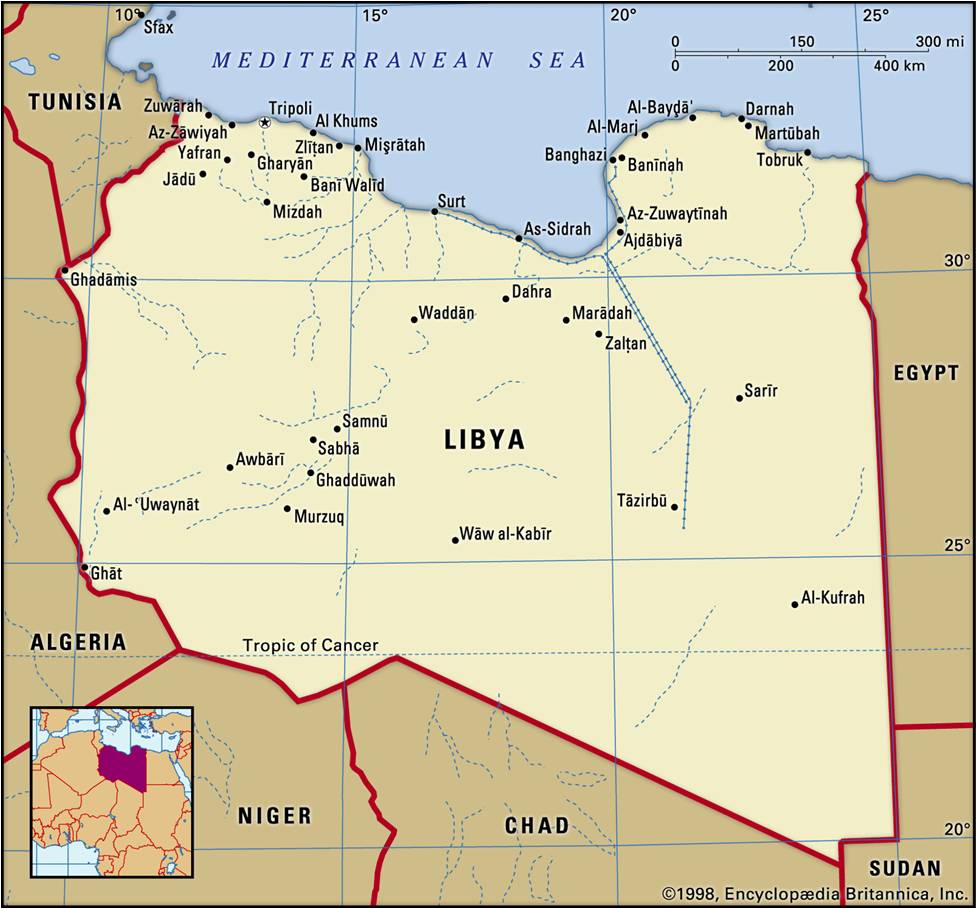
(The paper is the author’s individual scholastic articulation. The author certifies that the article/paper is original in content, unpublished and it has not been submitted for publication/web upload elsewhere, and that the facts and figures quoted are duly referenced, as needed, and are believed to be correct). (The paper does not necessarily represent the organisational stance... More >>

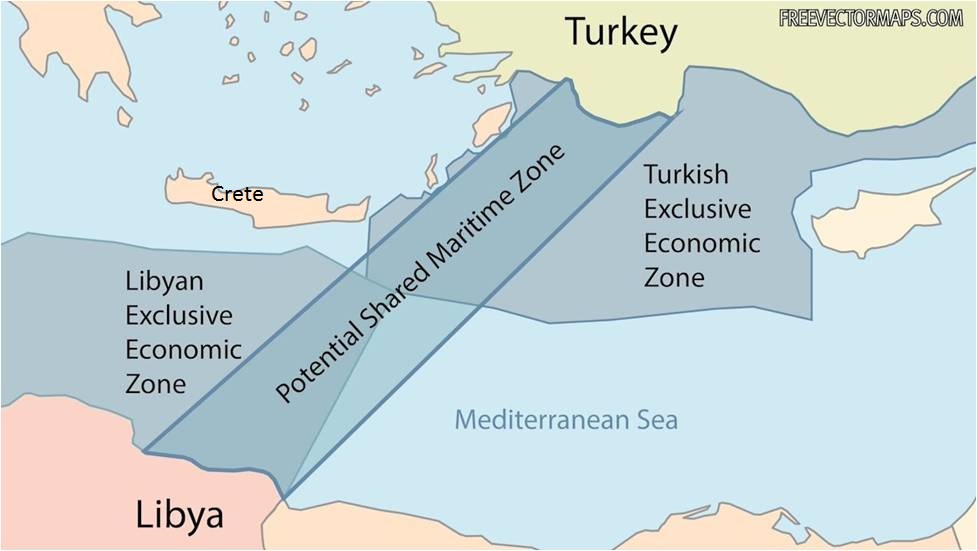
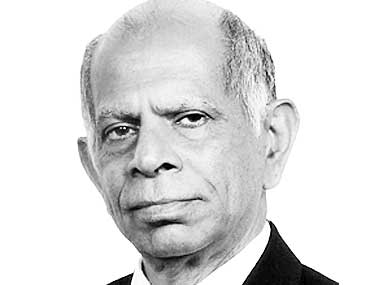








Post new comment